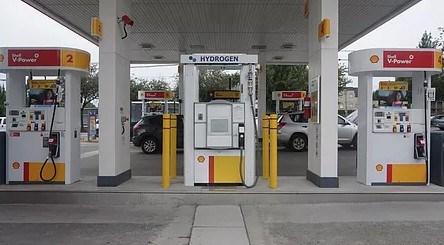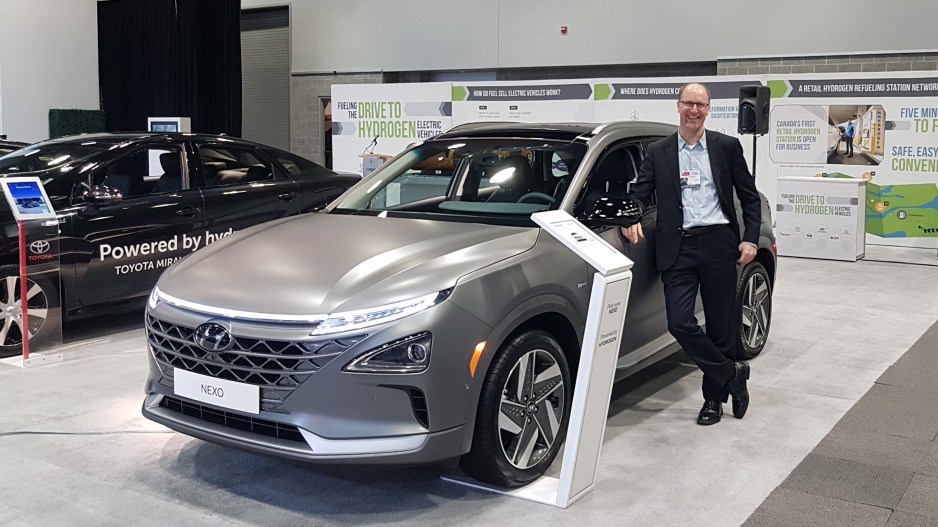Will 2019 be the year that Vancouver – the birthplace of hydrogen fuel cell technology – actually see more hydrogen fuel cell cars on the road than hydrogen fueling stations?
Hydrogen Technology & Energy Corp. (HTEC) is banking on the idea that building out a hydrogen fuel cell car fueling network here will be the final push needed to prompt environmentally conscientious Vancouverites to opt for a hydrogen fuel cell car for their next vehicle purchase.
HTEC has plans to build six fueling stations in the region. One already opened last year, and two more will open this year.
Unfortunately, new incentives announced in this week’s federal budget for electric vehicles and hydrogen fuel cell vehicles may not apply to hydrogen fuel cell cars, because of their price.
The federal rebate is only available for cars with a pricetag of $45,000 or less. No such beast yet exists in the hydrogen fuel cell car market, as far as Blair Qualey, president of the New Car Dealers Association, is aware. In Canada, a hydrogen fuel cell car costs in the $50,000 to $60,000 range.
So unless Ottawa finds some way of applying its incentives to lower the retail price, would-be buyers for hydrogen fuel cell cars may not be eligible for the federal rebate.
The federal funding announced earlier this week will definitely be good for EV sales, however. The federal budget, delivered March 19, includes $300 million for electric and hydrogen fuel cell vehicle subsidies over three years.
On new cars with a retail price of $45,000 or less, buyers would be eligible for up to $5,000 in rebates.
B.C. and Quebec already offer provincial rebates. In B.C., the rebate is up to $5,000 for a battery electric and up to $6,000 for a fuel cell car. (The price point for eligibility is higher in B.C. – $77,000 – so the rebate in B.C. actually does apply to hydrogen fuel cell cars.)
It wasn’t clear when the federal funding was first announced whether buyers in B.C. and Quebec would be eligible for the federal subsidies, since those provinces already have provincial subsidies.
“We hope it’s stackable with the B.C. program and the Scrap-It program,” Qualey said.
In an email to Business in Vancouver, the federal Ministry of Finance confirmed it is, though it’s still not clear just how the federal and provincial programs will dovetail.
“The federal purchase incentive for electric battery or hydrogen fuel cell vehicles with an MSRP (manufacturer's suggested retail price) of less than $45,000 can be used in conjunction with other incentive programs offered by provinces and territories,” a ministry spokesperson wrote.
“Details on program design will be available in the coming months.”
If the full federal subsidy applies, that could bring the rebate for a battery electric car in B.C. up to $10,000. Hydrogen fuel cell cars likely won’t qualify for the federal rebate, however, until their price comes down.
While EV sales are up in B.C., the number of hydrogen fuel cell cars on the road in Vancouver may not even be in the single digits yet.
Their price is not the only deterrent for buyers here. A lack for fueling infrastructure is also a serious deterrent.
“You have to build the station network before you can sell the car,” said HTEC CEO Colin Armstrong. HTEC is now building out that infrastructure.

Last year, HTEC opened a new hydrogen fueling station at a Shell gas station at 8686 Granville Street. Just this week, HTEC announced a partnership with 7-Eleven that will see new hydrogen fuel cell stations open this year in north Vancouver and Victoria. HTEC ultimately plans to have six hydrogen fueling stations in the Victoria-Lower Mainland region by the end of 2020.
“In Vancouver, we are trying to put in a network of the key intersections,” Armstrong said.
Hyundai Auto Canada Corp. recently announced it will be supplying two new NEXO hydrogen fuel cell cars to the car-sharing co-op Modo.
Armstrong said the cost of fueling a hydrogen car is roughly on par with a conventional gas-powered vehicle – about $65 for a fill-up, or $12 to $15 per 100 kilometres.




